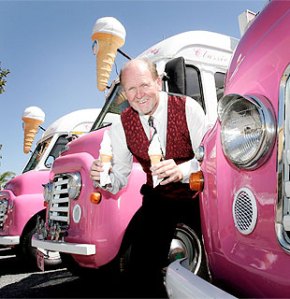Adam Bandt is the Australian Greens candidate for the seat of Melbourne.

Under Australia’s representative system, Adam Bandt has to win more primary and preference votes than his nearest rival to take a seat in the House of Representative, where Government is formed. The Greens have never before had a candidate win a seat in the lower house.

Having a seat in the lower house would be a big moment for the third party* of Australian politics. Depending on how many seats the big parties win, and how many other independents win, they could hold the balance of power.
Also they would benefit from exposure and political funding:
Registered political parties are entitled to election funding where their endorsed candidate or Senate group receives at least 4% of the formal first preference votes, according to the Australian Electoral Commission.
The Greens’ popularity has boomed. Opinion polls show them up from 7.8 percent to 10 percent nationwide and from 10 percent to 18 percent in Melbourne (for state government, considered a fair bellwether).
It’s also worth noting that the Greens were at 16 percent in late May and 10 percent by late June. The difference is Ms Gillard, and this is where we get to how Mr Hotelling will be so good for the Greens.
The Greens are a stain on the wall to wall beige carpets of Australian politics. If you’ve noticed that Labor and coalition policies are often indistinguishable, Harold Hotelling’s model explains that this is not just a coincidence.
The Hotelling model explains where two competing businesses should locate on a 1-dimensional space. Imagine two identical ice-cream vendors on a beach. If one locates at one end at one at the other, they each can capture the other one’s market by moving toward the middle.
The only stable end result is that they locate right in the middle, right next to each other.
If you’ve ever wondered why there are no florists for miles and then two right next to each other, Hotelling has the answer.
And the model can apply to non-physical spectrums too. If I want to capture your breakfast cereal customers while retaining my own, I have to make mine as sweet and sugary as yours. If I want your voters, I have to make my policies as tough and uncompromising as yours.
There are differences between the major parties, not least in history and leadership styles. But the policy differences seem to be eroding, as recent asylum seeker announcements ably demonstrate.
If the Greens voters give up on Gillard, and it seems possible they will, they’ll go back Green. And that’s because the Greens operate outside this field of magnetic attraction.
The Greens have another effect. They pull Labor left, and, following Hotelling’s model, pull the Coalition left with them. See Turnbull, M.
When Pauline Hanson ruled the One Nation party, she pulled the Liberals right, and Labor faithfully followed.
Hanson’s vote shows there are voters who object to having two parties whose policies are mirrors of the other. Many of these voters go Green. Maybe they object to the policies of the major parties. Maybe they object to some of the Greens policies too but want to support the provision of alternatives.
One reason people don’t vote Green is a fear of ‘wasting’ their vote. If the Greens can get a seat in the lower house, it will make them seem a lot more ‘real’. There is a real chance their success could snowball. The trick for Mr Bandt then will be not to drive the ice-cream van too close to the others.
*It’s worth saying the Greens are actually the fourth party of Australian politics, but we hear from the National Party these days about as much as from Ossie Ostrich.
I assume this is mainly due to the limply submissive role they play in their coalition with the Liberal party.



Interesting post. Harold Hotelling was one smart cookie. I have always wondered about why most products in a category cluster around the centre seemingly defying efficiency, innovation and creating wastful duplication. There should be active interference in markets to discourage the effect. Then again maybe the centering effect makes for more stable politics.
LikeLike
And John Quiggin is endorsing the Greens here
http://johnquiggin.com/
Seems like lots of people are endorsing them. Since their vote has long been kept down by people feeling it was wasteful or weird or wrong or silly to vote Green, this election could really be their time.
LikeLike